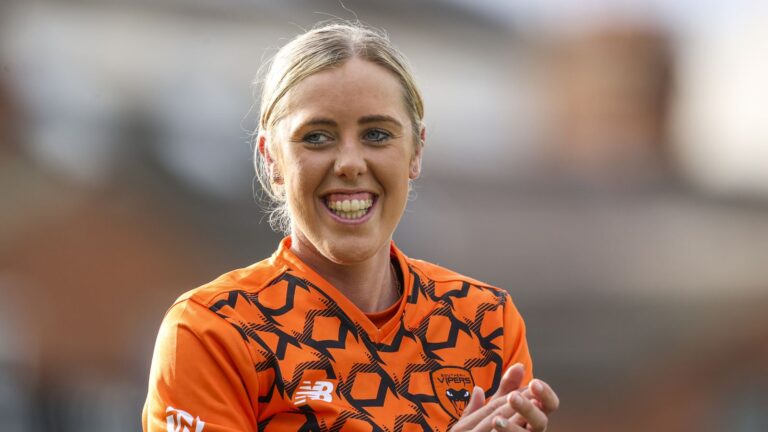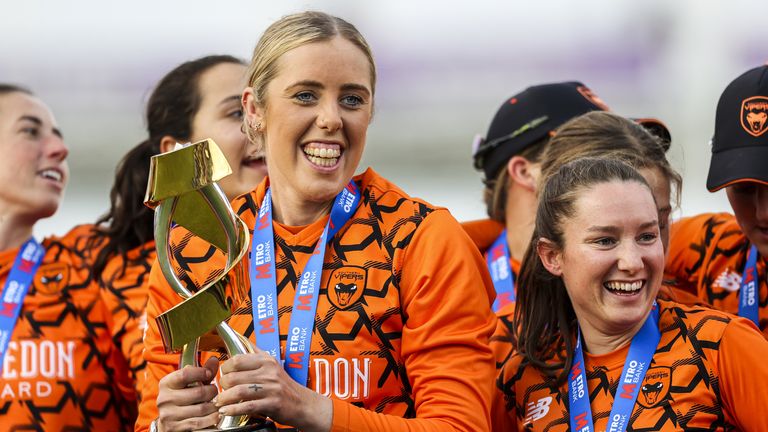Southern Vipers captain Georgia Adams spoke to Sky Sports News on her journey as an LGBT+ cricketer, the valuable advice she received from her grandmother and why we need more inclusive environments across the country…
Cricket is currently celebrating Rainbow Laces from June 29 to July 7 to show support for the LGBT+ community.
England and New Zealand women’s teams wore rainbow laces and played with rainbow stumps in their ODI win on Sunday. The ECB, first-class counties, regional women’s teams and recreational clubs are also involved.
The teams will support the seventh year of the Rainbow Laces cricket campaign in the Vitality Blast, Rachael Heyhoe Flint Trophy and County Championship fixtures.
“Everyone should have the right to feel good about themselves, whether it’s in sports, at work or in everyday life,” Adams said. Sky Sports News journalist Evie Ashton.
“If you want to get the best out of people, you want them to be happy with who they are and feel safe in a safe environment. That did me the world of good.”
The 30-year-old all-rounder has led the Southern Vipers to five titles across the Charlotte Edwards Cup and Rachel Heyhoe Flint Trophy, and also captained the Southern Brave to their first Hundred title last year.
Adams believes growing up in Brighton, known for its LGBT+ inclusion, helped her come out while at Loughborough University.
“(At university) the space of combining multiple sports allowed you to be yourself. Everyone was incredibly accepting and understanding of how everyone wanted to identify or experience their sexuality.
“I knew my mom was coming to visit and I didn’t trust my friends not to drop something in there or make a joke about someone I’d been with,” she laughs.
“So I had the courage to tell (my family). I said I wasn’t necessarily a lesbian, but it was also something I had explored, so I wanted them to be aware of it and they were brilliant.”
Despite his positive experience compared to many others, Adams could not escape the social pressures that often reinforce the idea that heterosexuality is the norm.
“It always comes with pressures and challenges when you come home or when you’re out with family and friends,” she said.
“When I was doing things with my partner and our family, people would often say, ‘Oh, who is that?’ And there would be a sense of embarrassment because you didn’t know how someone else was going to take it.
“Nothing really prepares you for the pressures that come with (coming out).
“Defining myself by a label was something that was difficult for me. Some LGBT+ people feel a strong need for a label to be themselves and for me, it wasn’t about being pigeonholed into a specific label for going through the ups and downs of discovering my sexuality.”
In 2019, Adams captained the Sussex women’s team and became the youngest player to play 100 senior games for the county. She also capped off a fine campaign last year by being named Rachael Heyhoe Flint Trophy Player of the Year and PCA Women’s National Overall Most Valuable Player.
Her father, former Sussex captain and England international Chris Adams, told her that his grandmother had faced similar difficulties. It is one of the many reasons why Georgia Adams sees her as a role model.
Adams said: “It was a lot harder for that generation and my grandmother told me her mother told her, ‘If you want to make it in this world, Lynn, you have to marry a man and have children.’
“It’s sad that she may have never been truly happy for a long time. She thought that when my father and his brother were old enough, she could actually make a choice that would make her happy and know that they would be okay. She did, which led to her separation from my grandfather.
“When you talk to people like that, who feel like they have to be a certain way to succeed in the world, it’s sad. You wonder if you’re holding yourself back or what you could have accomplished if you could have lived the life you wanted to live deep down?”
“When she passed away, I was so happy to see how many people I hadn’t spoken to in years reached out to me and said, ‘I’m devastated. I can’t believe it.’ She had such a presence about her and was there for me through thick and thin.
“At the age of 20, I already had an incredibly close bond with my grandmother and to explore this other path with her and have someone so open and close by my side who could listen to my story and give me advice was fantastic.”
For Adams, cricket has been a safe and welcoming environment since she first picked up a bat at the age of three.
“Cricket was an area where I could really be confident. As a teenager I didn’t have a lot of confidence and I was worried about what other people thought of me and my image.
“Cricket gave me a way for you and your friends to love each other for who you are, no matter what.”
“At Southern Vipers, one of our core values is to accept and appreciate individuality, because the last thing we want is for someone to hold themselves back because they don’t feel like they can be themselves.”
“It’s hard enough to put in good performances, so it’s an area we’ve really focused on and as captain of this group I’m incredibly proud of that.”
But Adams knows that’s not the case across cricket as a whole, having reflected on the lack of professional male cricketers with her father, who is now an England batting scout and head of cricket at Seaford College.
“When I was younger, my dad would say to me, ‘Please, please, please don’t date a male cricketer. Promise me.’ After some of the things he heard and experienced in the dressing room as a player, in a way he’s probably delighted (that I’m LGBT+),” she laughs.
“The male culture is different and they feel they have to be and behave a certain way to be successful in professional sports. It’s difficult for men.
“When he was Surrey coach he was very fortunate to work with Steven Davies who was in the men’s team.” (In 2011, the England and Surrey wicketkeeper became the first professional cricketer to come out as gay.)
“(My father) said the most important thing in life was to be happy.”
Adams wants her positive experiences as an LGBT+ person to become normalised for everyone on and off the pitch.
“I’ve been very fortunate in my journey with the environments I’ve entered, but I’m very aware that not everyone has the same experiences,” she added.
“Creating as many positive influences and campaigns as possible, like the ECB Rainbow Laces, to show our support is really important.
“If we can make the world as inclusive, diverse and tolerant as the region I grew up in, I hope more people will start to express themselves and enjoy life more.”






